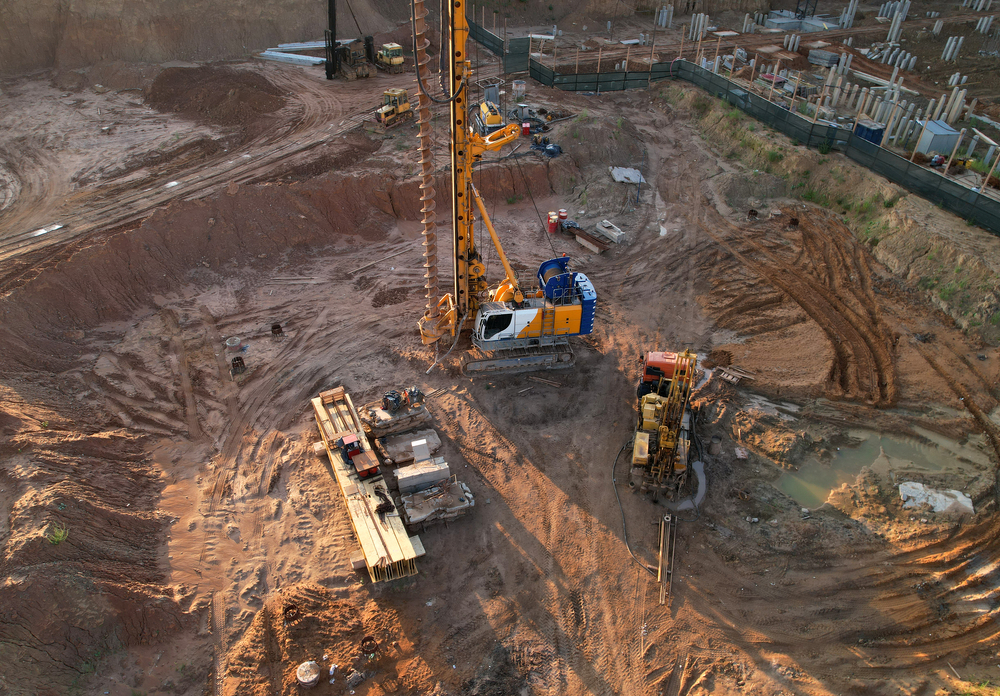What Does Geotheta Mean?
What Does Geotheta Mean?
Blog Article
Getting The Geotheta To Work
Table of ContentsGeotheta Things To Know Before You Buy4 Easy Facts About Geotheta ExplainedSome Known Questions About Geotheta.Geotheta - The FactsSome Known Questions About Geotheta.

They conduct site examinations, accumulate samples, perform lab tests, and assess information to examine the viability of the ground for construction projects - Tailings Engineer. Based upon their searchings for, geotechnical engineers offer recommendations for foundation design, slope security, preserving structures, and mitigation of geotechnical dangers. They team up with various other specialists, such as architects, architectural designers, and construction groups, to guarantee that geotechnical factors to consider are integrated right into the general job style and implementation
By evaluating the behavior and buildings of soil and rock, they can identify potential geotechnical threats such as landslides, dirt negotiation, or incline instability. Their experience aids stop failings or crashes that can endanger lives and residential property. Below are some in-depth duties and duties of a geotechnical engineer: Website Investigation: Geotechnical designers conduct website examinations to gather data on subsurface problems.
They interpret the information to comprehend the properties and habits of the soil and rock, including their toughness, permeability, compaction features, and groundwater problems. Geotechnical Analysis and Style: Geotechnical designers analyze the information gathered throughout website examinations to assess the stability and suitability of the website for construction projects. They perform geotechnical computations and modeling to examine factors such as birthing capability, negotiation, incline stability, side earth stress, and groundwater circulation.
The smart Trick of Geotheta That Nobody is Talking About
Structure Design: Geotechnical engineers play a vital duty in making structures that can securely support the desired framework. They assess the soil conditions and load demands to establish the proper structure kind, such as superficial foundations (e.g., footings), deep foundations (e.g (http://go.bubbl.us/e3adfd/a28b?/Geotheta)., stacks), or specialized techniques like soil renovation. They consider elements such as settlement limits, bearing capability, and soil-structure interaction to create ideal structure designs
They evaluate building and construction plans, monitor website tasks, and perform field assessments to validate that the layout referrals are followed. If unanticipated geotechnical problems emerge, they analyze the scenario and supply referrals for remediation or adjustments to the style. Danger Analysis and Reduction: Geotechnical engineers analyze geotechnical dangers and dangers related to the task site, such as landslides, liquefaction, or dirt erosion.

Collaboration and Interaction: Geotechnical engineers work closely with other professionals associated with a task, such as designers, structural designers, and building teams. Effective interaction and collaboration are vital to integrate geotechnical factors to consider into the general job design and building process. Geotechnical designers supply technological knowledge, response questions, and make sure that geotechnical needs are satisfied.
How Geotheta can Save You Time, Stress, and Money.
Below are some types of geotechnical engineers: Structure Designer: Structure engineers focus on designing and assessing structures for frameworks. They examine the dirt conditions, tons needs, and website characteristics to figure out the most proper structure type and style, such as superficial structures, deep foundations, or specialized methods like heap foundations.
They evaluate the elements influencing slope stability, such as soil residential properties, groundwater conditions, and slope geometry, and create methods to avoid incline failings and reduce threats. Earthquake Designer: Quake engineers focus on assessing and designing structures to stand up to seismic pressures. They examine the seismic risk of a site, review soil liquefaction potential, and develop seismic design standards to guarantee the safety and strength of frameworks throughout quakes.
They do field testing, gather samples, and evaluate the collected data to define the soil properties, geologic formations, and groundwater conditions at a website. Geotechnical Instrumentation Engineer: Geotechnical instrumentation engineers focus on surveillance and gauging the behavior of dirt, rock, and structures. They install and preserve instrumentation systems that keep an eye on elements such as dirt negotiation, groundwater degrees, slope activities, and architectural displacements to evaluate efficiency and supply early cautions of potential concerns.
Getting The Geotheta To Work
They conduct tests such as triaxial examinations, consolidation examinations, straight shear tests, and leaks in the structure examinations to gather data for geotechnical evaluation and layout. Geosynthetics Designer: Geosynthetics engineers concentrate on the style and application of geosynthetic products, such as geotextiles, geogrids, and geomembranes. They utilize these materials to enhance dirt stability, strengthen slopes, supply drainage remedies, and control erosion.
They have a tendency to be investigatory individuals, which implies they're intellectual, reflective, and curious. They are curious, systematic, sensible, analytical, and rational. Some of them are additionally social, suggesting they're kind, generous, participating, patient, caring, useful, compassionate, sensible, and pleasant - Geotechnical Engineers.
In the workplace atmosphere, geotechnical designers use specialized software tools to carry out estimations, develop styles, and analyze data. They prepare records, testimonial task requirements, interact with customers and employee, and coordinate project tasks. The workplace setting provides a favorable environment for study, analysis, and collaboration with other professionals entailed in the job.
Geotheta for Dummies
They frequently visit task websites to conduct website investigations, evaluate geotechnical problems, and gather data for analysis. These check outs include traveling to various places, occasionally in remote or difficult surfaces. Geotechnical designers might carry out dirt tasting, conduct examinations, and monitor construction activities to guarantee that the geotechnical facets of the task are being implemented appropriately.
Geotechnical engineers also operate in specialized geotechnical labs. In these facilities, they perform experiments, execute examinations on soil and rock samples, and analyze the engineering residential or commercial properties of the products. Geotechnical research laboratory engineers function extensively in these atmospheres, dealing with screening devices, running tools, and taping data. They work together with various other research laboratory personnel to make sure precise visit their website and trustworthy screening results.
Report this page